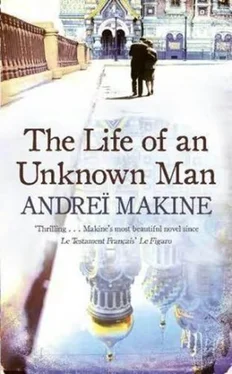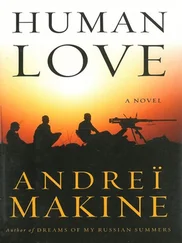Andreï Makine - The Life of an Unknown Man
Здесь есть возможность читать онлайн «Andreï Makine - The Life of an Unknown Man» весь текст электронной книги совершенно бесплатно (целиком полную версию без сокращений). В некоторых случаях можно слушать аудио, скачать через торрент в формате fb2 и присутствует краткое содержание. Жанр: Современная проза, на английском языке. Описание произведения, (предисловие) а так же отзывы посетителей доступны на портале библиотеки ЛибКат.
- Название:The Life of an Unknown Man
- Автор:
- Жанр:
- Год:неизвестен
- ISBN:нет данных
- Рейтинг книги:3 / 5. Голосов: 1
-
Избранное:Добавить в избранное
- Отзывы:
-
Ваша оценка:
- 60
- 1
- 2
- 3
- 4
- 5
The Life of an Unknown Man: краткое содержание, описание и аннотация
Предлагаем к чтению аннотацию, описание, краткое содержание или предисловие (зависит от того, что написал сам автор книги «The Life of an Unknown Man»). Если вы не нашли необходимую информацию о книге — напишите в комментариях, мы постараемся отыскать её.
The Life of an Unknown Man — читать онлайн бесплатно полную книгу (весь текст) целиком
Ниже представлен текст книги, разбитый по страницам. Система сохранения места последней прочитанной страницы, позволяет с удобством читать онлайн бесплатно книгу «The Life of an Unknown Man», без необходимости каждый раз заново искать на чём Вы остановились. Поставьте закладку, и сможете в любой момент перейти на страницу, на которой закончили чтение.
Интервал:
Закладка:
He did not have to wait five years. Two and a half years later Stalin died and in the human tide pouring out through the gates of the camps Volsky was sure he would find Mila again.
One evening in April he was walking beside the railroad track on his return from work and from a long way off saw a woman seated on a little bench beneath the windows of the building where he lived. He slowed his pace, hearing dull, heavy drumbeats pounding in his brain. The woman’s hair was white and her face, seen in profile, lined with deep wrinkles. “More than seven years in a camp…,” he thought, and felt himself bowed down beneath a weight pressing him toward the earth. Mila’s face, aged, was a final ordeal for him, possibly the hardest. And yet this culminating blow, struck by a god who delights in causing suffering, seemed to him petty and futile. Nothing could harm a life that would be reborn beneath the sky where for so many years their eyes had met.
His urge to say this was so acute that he broke into a run.
The woman turned. It was not Mila! A much older woman, who had been arrested with her, who had promised Mila she would find him. What she had to say amounted to a few words. “Ten years in a camp without the right to correspondence,” such was the official sentence. Few people knew that this “without the right to correspondence” signified that the condemned person was shot following the verdict. Sometimes letters from family members continued to arrive throughout those ten years of waiting…
Volsky remained sitting down, his eyes fixed upon the silhouette of the woman as she walked away, jolting from one tie to the next. He should have detained this freed prisoner, asked her questions, offered her tea, given her shelter… He would have done so but the world, already scarcely real, had vanished. There was nothing but these rails disappearing into the dusk, this elderly woman, walking away into the void, the words she had spoken, the last words that concerned him. An empty world.
He got up, looked at the sky. And sensed on his lips the emergence of a voice that would reach Mila. His lungs dilated. But instead of a cry, what came out was a long whisper tormented by a thirst. A terrible craving. One that came from not knowing how, with words, to bring the one he loved back to life.
V

The same thirst…,” thinks Shutov as he watches the old man taking long drafts of cold tea.
“Forgive me, I’ve grown unused to talking.” Volsky smiles, sets the cup down on the bedside table again. They are silent, not knowing how to conclude this nocturnal recital. To say good-bye, part, go to bed? Shutov understands that he has just entered a world where one cannot lie, not by word or gesture. He stares into the blackness outside the window: a brief period of dark at the heart of a northern summer night. On the silent television screen the procession of heads of state can be seen entering a banquet hall…
The old man has been speaking for barely an hour. His youth, the dead city in the blockade, the war, the camp. And the wild cherry blossoms fluttering down on a spring evening long ago.
His account has been restricted by a fear of relating facts too familiar, of repeating himself. On several occasions he has observed, “All this is well known now.” It was as if he were afraid of placing his own story beside the epic narratives that have exhausted the subject. “Not everyone had my luck, you know.” Not everyone, no, those who died of hunger during the blockade, those who were killed in battle, those who froze to death in the ice of the camps.
Shutov looks away, the words he could utter seem so pointless. On the screen an aerial view of London, a documentary about the new Russian elite, the title: Moscow on Thames…
“There’s nothing exceptional about my case,” the old man had also remarked. Shutov thinks about this: it is true, even in his youth he has heard tell of these broken lives. Millions of souls lacerated by the barbed wire. The camps occupied one-twentieth of the vast expanse of the Soviet Union, ten times the area of Great Britain, whose green pastures are just now gliding by on the screen. To disappear into this void was not a rare fate, old Volsky is right.
A voice within Shutov rebels: but no, the life story that has just been confided to him is unique and incomparable… He pictures a woman amid the huts surrounded by watchtowers and a man in a line of prisoners. They both look up, observe the slow-moving clouds, feel the cold kiss of snowflakes on their brows. They are thousands of miles apart. And very close to one another, as close as the mist from their breathing.
Shutov knows what he should ask Volsky now: and after that, did he ever again seek to meet up in the sky with the eyes of the one he loved?
He hesitates, stammers, “And after that?…” As if he wanted to know how the story ended, as if the presence of the old man in this little room were not already an ending.
Volsky takes another drink, then, in a voice much less tense, murmurs: “Afterward… I hardly spoke anymore and people began to believe I was dumb. It was as if I were dead, or at least absent from their world.”
This absence was made up of frozen dusks in a small Siberian town, the place where his life had run aground. Of work that reminded him of his labor as a prisoner. Of alcohol, the only means of escape for him, as for so many others. He remained silent, knowing now that one could live very well without words and that all people needed from him was his strength, his resignation, yes, precisely that, his absence.
There was only one day when he broke his silence. He was working in a machine shop where they repaired the side panels of railway carriages, the foreman swore at him, called him a filthy jailbird. Volsky hit out and muttered at the man, as he lay there on the ground, “Choose your weapon, sir!”
The officer in the militia who interrogated him was young, very self-assured. Volsky noticed at once that he resembled the investigating officer who had sent him to the camp. The same fair hair, the same uniform too big for a puny body. There was also a little low window that looked out onto a snowy street…
Volsky stopped answering, dazzled by a truth that suddenly threw light on this world, whose obtuse cruelty he had sought to understand. So this was it: a perpetual vortex, a circle dance with recurring roles, similar faces, always parallel circumstances. And always the same will to deny that which is truest, most profound in man. Snow, a woman looking up at the sky…
“According to the foreman,” the officer was saying, “you made anti-Soviet statements while causing him bodily harm…”
Staring at this young face, animated by fierce scowls, Volsky smiled and remained silent. The world that had just revealed its insane governing principle no longer interested him. “A mad merry-go-round,” he thought. “The same faces, the same wooden animals revolving faster and faster.” A few years after the war with its millions of dead they were already testing a new bomb (he had read about it in a newspaper) that would be able to kill even more people. Three years after Stalin’s death they were explaining that everyone he had massacred had been annihilated by mistake, thanks to a simple doctrinal distortion. And now there was this little blond officer, getting heated, yelling, thumping his fist on the table, no doubt about to strike the prisoner sitting in front of him. “And then this blond fellow’s nose will start bleeding. And I’ll advise him to pick up a handful of snow. He’ll do this. And we’ll have a brief, humane interlude…”
Volsky realized he had been saying all this aloud and the officer was listening to him, open-mouthed and wide-eyed. “You’ll see. A handful of snow and the bleeding will stop…” He was then overtaken by a violent outburst of laughter, almost painful, for his wrists, tied behind his back, wrenched his shoulder at each guffaw. “It’s a nightmare circus! A great nightmare circus!” he exclaimed, amazed to find that this simple phrase summed up the madness of the world so well.
Читать дальшеИнтервал:
Закладка:
Похожие книги на «The Life of an Unknown Man»
Представляем Вашему вниманию похожие книги на «The Life of an Unknown Man» списком для выбора. Мы отобрали схожую по названию и смыслу литературу в надежде предоставить читателям больше вариантов отыскать новые, интересные, ещё непрочитанные произведения.
Обсуждение, отзывы о книге «The Life of an Unknown Man» и просто собственные мнения читателей. Оставьте ваши комментарии, напишите, что Вы думаете о произведении, его смысле или главных героях. Укажите что конкретно понравилось, а что нет, и почему Вы так считаете.









